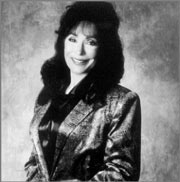LORETTA LYNN
Bumbershoot, $12 3:45 p.m., Sat. Sept. 1
NO OTHER LIVING FIGURE in country music, save perhaps Johnny Cash, is as iconic as singer-songwriter Loretta Lynn. Her debut single, 1960’s “Honky Tonk Girl,” was the first of countless classics, many of which—”The Pill,” “Rated X,” “You Ain’t Woman Enough (to Take My Man)”—challenged conservative notions of what was appropriate material for a female artist. In the ’70s, she also recorded a series of chart-topping duets with Conway Twitty (“After the Fire Is Gone,” “Back Street Affair”), including five consecutive No. 1 hits. Although she was born and raised in eastern Kentucky and today resides in Tennessee, fans of her acclaimed autobiography, Coal Miner’s Daughter (which was also made into a film), will recall that that Lynn began her singing career in Washington. After spending a decade out of the limelight caring for her ailing husband, Oliver “Mooney” (or “Doo,” short for “Doolittle”) Lynn, who passed away in August 1996, the 66-year-old no-nonsense pioneer finally resumed recording with last year’s Still Country.
Seattle Weekly: You spent a pivotal period of your life in Custer, Wash. Are your memories of that time fond ones?
Loretta Lynn: Oh, yes. I come out there when I was pregnant with my first baby, and I spent 13 years there. That’s where I had all my babies, except the twins. That’s God’s country.
Plus you won all those blue ribbons for canning at the State Fair.
First year I ever canned! The lady that taught me how to can, she lost. She said, “I shouldn’t have taught you!”
Your last album was a very effective mix of classic and contemporary country sounds. Have you ever considered doing a roots record, ᠬa Dolly Parton’s recent bluegrass sets?
Yeah, but why go back farther than we started from? We tried our best to get [country music] out of the barnyard, to keep me from having to sit on a bale of hay when I sing on TV. [Today] they’re either going too far out or too far back. I think they’re going too far back with the acoustic sound.
Do you feel like making the last album, Still Country, helped you come to terms with Mooney’s passing?
I think so, but I really had a hard time. I think even if you hadn’t know my life at all, you could probably have listened to that album and told what I was going through.
Rumor has it you’re working on the follow-up to Coal Miner’s Daughter.
Yeah, I have a new book. It will be starting from my first memory. The other one just started from my 13th birthday, till I was about 29. This one will be a little bit different. I’ve lived now. There’s a lot of hurtful things in it, but there’s a lot of happiness in it, too.
That’s why people love your music, too; you’re very honest about life’s ups and downs.
That’s right. When they [first adapted] Coal Miner’s Daughter, they Hollywooded it up. When you Hollywood something up, you don’t have the truth—and I wanted the truth. It took three times for them to write the script before I would sign [off on] it.
Tell us a little bit about your new museum, which opened in Hurricane Mills, Tenn., last May.
I have the first bedroom suite that Hank Williams ever had. It’s set up just like I got it. Me and Doo slept in it for 25 years. And then I’ve got the old schoolhouse set up and my first front room from when we come back [East]. The furniture don’t look too hot, but it’s as good [as] I could do.
Is the nightgown Patsy Cline gave you on display?
The sexy one? You bet! It’s red, too. [Laughter] She always said, “If you wanna turn on a man, just wear this.” I never did get to wear it, because I kept it. And of course, I would never try and turn on a man in the first place—I was married. She was a character. There wasn’t nothing phony about Patsy. I loved her.
If a little green man from outer space landed on your porch and asked you the difference between pop and country, what would you say?
I’d tell him you can’t hear it today! But I might be able to put on one of mine and Conway’s albums.
Let’s talk about that. What was the secret of your chemistry with Conway?
Me and Conway tried to outsing each other. We had business together for 20 years. When we walked into that studio, we had our songs picked, we’d already listened for three or four nights and made sure [everything] was ready. Today, it takes ’em years to do an album. I don’t like that.
You came from a very poor background and did quite well for yourself. Are you concerned about the widening gap between rich and poor folks in America?
I’m very disturbed by it. Just because you’ve got a little money don’t mean that you’re better than nobody else. You ought to try to help somebody else that’s not. A lot of people that’s got a lot of money, they’re gonna keep it. But they’re not gonna bury you with it. Somebody’s waiting for you to die just to get it!






